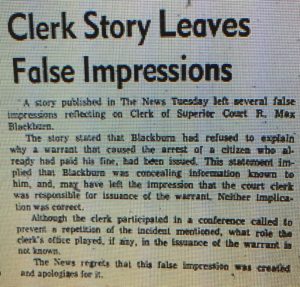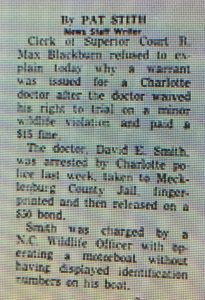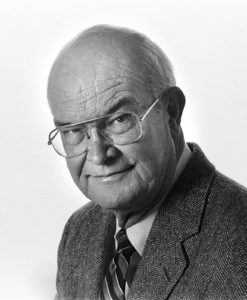Wednesday morning, May 12, 1971
Perry Morgan, editor of The Charlotte News, called me into his office to questioned me about the lede I had written on a story The News had published the previous afternoon.
My lede said the Mecklenburg County Clerk of Superior Court had refused to explain why an arrest warrant had been issued for a doctor after he had waived his right to trial on a minor boating violation and paid the $15 fine.
Charlotte police subsequently arrested the doctor in the middle of the night for failure to appear in court, took him to jail, fingerprinted him, and released him on a $50 bond.
Perry asked me to tell him how the clerk of court’s office was responsible. I didn’t know how the mistake had been made –the clerk wasn’t talking– but I had covered that beat and I knew how the system worked. The clerk’s office collected fines, the clerk’s office scheduled the trials of those who did not pay their fine, and the clerk’s office issued arrest warrants for defendants who did not appear for trial.
That didn’t satisfied Perry. He wanted to know exactly what the clerk’s office had done in this case. I didn’t know exactly. Finally Perry told me he was going to retract my story — retract, correct, and apologize.
Wednesday afternoon
 At Morgan’s direction The News published a retraction that afternoon. I think he wrote it himself.
At Morgan’s direction The News published a retraction that afternoon. I think he wrote it himself.
“A story published in The News Tuesday left several false impressions reflecting on Clerk of Superior Court R. Max Blackburn,” the retraction began. It said my story “implied that Blackburn was concealing information known to him, and, may have left the impression that the clerk of court was responsible for issuance of the warrant. Neither implication was correct.”
“The News regrets that this false impression was created and apologizes for it.”
I was floored.
I couldn’t prove it yet, but I knew the clerk of court’s office was responsible and the clerk’s “No comment” had conceal information.
What had I done wrong? The story was correct. If it implied that the clerk’s office was responsible for the issuance of the arrest warrant, so what? His office was responsible.
I was beyond angry — I was done with The Charlotte News.
But I wasn’t done with that story.
Continued tomorrow.

